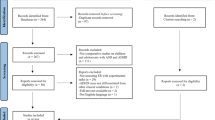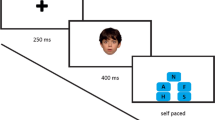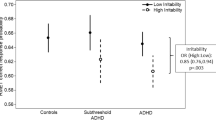Abstract
Facial expressions have significant communicative functions; any changes in the facial muscles help disentangle meaning, control the conversational flow, provide information as to the speaker/listener’s emotional state and inform about intention. Abnormalities in the recognition of facial expressions have been associated with psychiatric disorders. This review focuses on facial recognition abilities in children and adolescents with Attention Deficit Hyperactivity Disorder (ADHD). Using PRISMA guidelines original articles published prior to August 2019 were identified focusing on the emotion recognition skills of children and adolescents with ADHD and the measures administered. 25 studies were identified with the majority (18) showing some deficits on emotion recognition in children/adolescents with ADHD compared to typically developing (TD) children. The results are synthesized in terms of the type of stimuli implicated (static vs. dynamic), the measures/tasks administered, whether authors differentiated among specific emotion dimensions in the analysis of results, the effect of comorbidity on emotion recognition, and whether greater deficits have been reported for some emotions compared to others. Studies on facial emotion recognition in children and adolescents with ADHD focused mainly on the recognition accuracy of facial emotions, showing inconsistent results and a heterogenous use of measures. It is unknown whether the studies’ participants followed therapeutic plans (other than pharmacotherapy) at the time of the study or before, a factor that may potentially have influenced the review’s results.
Access this chapter
Tax calculation will be finalised at checkout
Purchases are for personal use only
Similar content being viewed by others
References
Airdrie, J.N., Langley, K., Thapar, A., van Goozen, S.H.M.: AC. J Am Acad Child Adolesc Psychiatry 57(8), 561–570 (2018). http://doi.org/10.1016/j.jaac.2018.04.016
Arsenio, W., Cooperman, S., Lover, A.: Affective predictors of preschoolers’ aggression and peer acceptance: direct and indirect effects. Develop. Psychol. 36(4), 438–448 (2000). https://doi.org/10.1037/0012-1649.36.4.438. [PubMed: 10902696]
Aspan, N., Bozsik, C., Gadoros, J., Nagy, P., Inantsy-Pap, J., Vida, P., Halasz, J.: Emotion recognition pattern in adolescent boys with attention-deficit/hyperactivity disorder. BioMed Res. Int. (2014). http://dx.doi.org/10.1155/2014/761340
Bal, Elgziz: Emotion Recognition and Social Behaviors in Children with Attention-Deficit/Hyperactivity Disorder (Published doctoral dissertation). University of Illinois at Chicago, Chicago, Illinois (2011)
Barkley, R.A.: Behavioral inhibition, sustained attention, an executive functions: constructing a unified theory of ADHD. Psychol. Bull. 121, 65–94 (1997)
Baum, K.M., Nowicki, S. Jr.: Perception of emotion: measuring decoding accuracy of adult prosodic cues varying in intensity. J. Nonverbal Behav. 22, 89–107 (1998)
Berggren, S., Engström, A.-C., Bölte, S.: Facial affect recognition in autism, ADHD and typical development. Cognit. Neuropsychiatry 21(3), 213–227 (2016). http://doi.org/10.1080/13546805.2016.1171205
Blair, R.J.R.: Facial expressions, their communicatory functions and neuro-cognitive substrates. Philos. Trans. R. Soc. B 358, 561–572 (2003). http://doi.org/10.1098/rstb.2002.1220
Boakes, J., Chapman, E., Houghton, S., West, J.: Facial interpretation in boys with attention deficit/hyperactivity disorder. Child Neuropsychol. 14, 82–96 (2008)
Bolte, S., Feineis-Matthews, Sabine, Leber, S., Dierks, T., Hubl, D., Poustka, F.: The development and evaluation of a computer-based program to test and teach the recognition of facial affect. Int. J. Circumpolar Health 61(2), 61–68 (2002). https://doi.org/10.3402/ijch.v61i0.17503
Bora, E., Pantelis, C.: Meta-analysis of social cognition in attention-deficit/ hyperactivity disorder (ADHD): comparison with healthy controls and autistic spectrum disorder. Psychol. Med. 46, 699–716 (2016). http://doi.org/10.1017/S0033291715002573
Boyatzis, C.J., Chazan, E., Ting, C.Z.: Preschool children’s decoding of facial emotions. J. Genet. Psychol. 154(3), 375–382 (1993). http://doi.org/10.1080/00221325.1993.10532190
Bruce, V., Campbell, R.N., Doherty-Sneddon, G., Langton, S., McAuley, S., Wright, R.: Testing face processing skills in children. Br. J. Dev. Psychol. 18, 319–333 (2000). http://doi.org/10.1348/026151000165715
Cadesky, E.B., Mota, V.L., Schachar, R.J.: Beyond words: how do children with ADHD and/or conduct problems process nonverbal information about affect? J. Am. Acad. Child Adolesc. Psychiatry 39(9), 1160–1167 (2000). http://doi.org/10.1097/00004583-200009000-00016
Caspi, A., Taylor, A., Moffitt, T.E., Plomin, R.: Neighborhood deprivation affects children’s mental health: environmental risks identified in a genetic design. Sage J. 11(20), 338–342 (2000). https://doi.org/10.1111/1467-9280.00267
Corbett, B., Glidden, H.: Processing affective stimuli in children with attention-deficit hyperactivity disorder. Child Neuropsychol. 6(2), 144–155 (2000). http://doi.org/10.1076/chin.6.2.144.7056
Corcoran, C.M., Keilp, J.G., Kayser, J., Klim, C., Butler, P.D., Bruder, G.E., … Javitt, D.C.: Emotion recognition deficits as predictors of transition in individuals at clinical high risk for schizophrenia: a neurodevelopmental perspective. Psychol. Med. 45(14), 2959–2973 (2015). http://doi.org/10.1017/S00332917150009024
Coy, K., Speliz, M.L., DeKlyen, M., Jones, K.: Social-cognitive processes in preschool boys with and without oppositional defiant disorder. J. Abnormal Child Psychol. 229(2) (2001). http://doi.org/107–119.10.1023/a:1005279828676 [PubMed: 11321626]
Da Fonseca, D., Sequier, V., Santos, A., Poinso, F., Deruelle, C.: Emotion understanding in children with ADHD. Child Psychiatry Human Dev. 40, 111–121 (2009)
Dadds, M.R., Cauchi, A.J., Wimalaweera, S., Hawes, D.J., Brennan, J.: Outcomes, moderators, and mediators of empathic-emotion recognition training for complex conduct problems in childhood. Psychiatry Res. 199(3), 201–207 (2012). https://doi.org/10.1016/j.psychres.2012.04.03
Dalili, M.N., Penton-Voak, I.S., Harmer, C.J., Munafò, M.R.: Meta-analysis of emotion recognition deficits in major depressive disorder. Psychol. Med. 45(6), 1135–1144 (2015). https://doi.org/10.1017/S0033291714002591
Davis, N.O., Kollins, S.: Treatment for co-occurring attention deficit/hyperactivity disorder and autism spectrum disorder. Neurotherapeutics 9(3), 518–530 (2012)
De Sonneville, L.M.J.: Amsterdamse neuropsychologische taken: wetenschappelijke en klinische toepassingen. J. Neuropsychol. 1, 27–41 (2005)
De Sonneville, L.M.J., Verschoor, C.A., Njiokiktjien, C., Op het Veld, V., Toorenaar, N., Vranken, M.: Facial identity and facial emotions: speed, accuracy, and processing strategies in children and adults. J. Clin. Exp. Neuropsychol. (Neuropsychol. Dev. Cogn. Sec. A) 24(2), 200–213 (2002). http://doi.org/10.1076/jcen.24.2.200.989
De Sonneville, L.M.J., Verschoor, C.A., Njiokiktjien, C., Op het Veld, V., Toorenaar, N., Vranken, M.: Facial identity and facial emotions: speed, accuracy, and processing strategies in children and adults. J. Clin. Exp. Neuropsychol. (Neuropsychol. Dev. Cogn. Sect. A) 24(2), 200–213 (2002). http://doi.org/10.1076/jcen.24.2.200.989
Denham, S.A.: Emotional Development in Young Children. Guilford Press, New York, London (1998)
Denham, S.A.: Social-emotional competence as a support for school readiness: what is it and how do we assess it? Early Edu. Dev. 17, 57–89 (2006). https://doi.org/10.1207/s15566935eed1701_4
Downs, A., Smith, T.: Emotional understanding, cooperation, and social behaviour in high-functioning children with autism? J. Autism Dev. Dis. 34, 625–635 (2004)
DuPaul, G.J., Volpe, R.J., Jitendra, A.K., Lutz, J.G., Lorah, K.S., Gruber, R.: Elementary school students with AD/HD: predictors of academic achievement. J. Sch. Psychol. 42(4), 285–301 (2004). https://doi.org/10.1016/j.jsp.2004.05.001
Ekman, P.: Universals and cultural differences in facial expressions of emotion. In: Cole J. (ed.) Nebraska Symposium on Motivation, 1971, vol. 19, pp. 207–282. University of Nebraska Press: Lincoln (1972)
Ekman, P.: Facial expression and emotion. Am. Psychol. 48(4), 384–392 (1992)
Ekman, P., Friesen, W.V.: Pictures of facial affect. Palo Alto. California: Consulting Psychologists Press (1976)
Elfenbein, H.A., Mandal, M.K., Ambady, N., Harizuka, S., Kumar, S.: Hemifacial differences in the in-group advantage in emotion recognition. Cognit. Emot. 18, 613–629 (2004)
Esposito, A., Esposito, A.M., Vogel, C.: Needs and challenges in human computer interaction for processing social emotional information. Pattern Rec. Lett. 66, 41–51 (2015)
Fayyad, J., De Graaf, R., Kessler, R., Alonso, J., Angermeyer, M., Demyttenaere, K.,… Lepine, J.P.: Cross-national prevalence and correlates of adult attention-deficit hyperactivity disorder. Br. J. Psychiatry 190(5), 402–409 (2007)
Goeleven, E., De Raedt, R., Leyman, L., Verschuere, B.: The karolinska directed emotional faces: a validation study. Cognit. Emotion 22(6), 1094–1118 (2008)
Gosselin, P.: Le décodage de l’expression faciale des émotions au cours de l’enfance (The decoding of facial expressions of emotions during childhood). Can. Psychol. 46, 126–138 (2005)
Gosselin, P., Larocque, C.: Facial morphology and children’s categorization of facial expressions of emotions: a comparison between Asian and Caucasian faces. J. Genet. Psychol. 161, 346–358 (2000)
Green, M.F., Kern, R.S., Robertson, M.J., Sergi, M.J., Kee, K.S.: Relevance of neurocognitive deficits for functional outcome in schizophrenia. In: Sharma, T., Harvey, P. (eds.) Cognition in Schizophrenia: Impairments, Importance, and Treatment Strategies, pp. 178–192. Oxford University Press, New York (2000)
Greenbaum, R.L., Stevens, S.A., Nash, K., Koren, G., Rovet, J., Form, T.R., … Program, M.: Social cognitive and emotion processing abilities of children with fetal alcohol spectrum disorders. Hyperact. Disord. 33(10), 1656–1670 (2009). https://doi.org/10.1111/j.1530-0277.2009.01003.x
Gur, R.C., Sara, R., Hagendoorn, M., Marom, O., Hughett, P., Macy, L.,… Gur, R.E: A method for obtaining 3-dimensional facial expressions and its standardization for use in neurocognitive studies. J. Neurosci. Methods 115(2), 137–143 (2002)
Guyer, A.E., McClure, E.B., Adler, A.D., Brotman, M.A., Rich, B.A., Kimes, A.S., Pine, D.S., Ernst, M., Leibenluft, E.: Specificity of facial expression labeling deficits in childhood psychopathology. Psychol. Fac. Public. 119 (2009)
Herba, C., Phillips, M.: Annotation: Development of facial expression recognition from childhood to adolescence: Behavioural and neurological perspectives. J. Child Psychol. Psychiatry 45(7), 1185–1198 (2004). https://doi.org/10.1111/j.1469-7610.2004.00316.x
Hess, U., Blairy, S.: Set of emotional facial stimuli. Department of Psychology, University of Quebec at Montreal, Montreal, Canada (1995)
Howlin, P., Baron-Cohen, S., Hadwin, J.: Teaching Children with Autism to Mind-Read: A Practical Guide. Wiley, West Sussex (1999)
Hoza, B., Mrug, S., Gerdes, A.C., Hinshaw, S.P., Bukowski, W.M., Gold, J.A., et al.: What aspects of peer relationships are impaired in children with attention-deficit/hyperactivity disorder? J. Cons. Clin. Psychol. 73, 411–423 (2005). https://doi.org/10.1037/0022-006X.73.3.411
Jusyte, A., Gulewitsch, M.D., Schönenberg, M.: Recognition of peer emotions in children with ADHD: evidence from an animated facial expressions task. Psychiatry Res. 258(2017), 351–357 (2017)
Kanade, T., Cohn, J.F., Yingli Tian.: Comprehensive database for facial expression analysis. Paper presented at the 4th IEEE International Conference on Automatic Face and Gesture Recognition (Cat. No. PR00580). Grenoble, France, 28–30 March 2000 (2000). http://doi.org/10.1109/afgr.2000.840611
Kara, H., Bodur, S., Çetinkaya, M., Kara, K., Tulaci, O.D.: Assessment of relationship between comorbid oppositional defiant disorder and recognition of emotional facial expressions in children with attention-deficit/hyperactivity disorder. Psychiatry Clin. Psychopharmacol. 27(4), 329–336 (2017). https://doi.org/10.1080/24750573.2017.1367566
Kochel, A., Leutgeb, V., Schienle, A.: Disrupted response inhibition toward facial anger cues in children with Attention-Deficit Hyperactivity Disorder (ADHD): an event-related potential study. J. Child Neurol. 29(4), 459–468 (2014)
Lai, Z., Hughes, S., Shapiro, E.: Manual for the tests of affective processing (MNTAP). University of Minnesota, MN (1991)
Langner, O., Dotsch, R., Bijlstra, G., Wigboldus, D.H., Hawk, S.T., van Knippenberg, A.: Presentation and validation of the radboud faces database. Cognit. Emotion 24(8), 1377–1388 (2010). https://doi.org/10.1080/02699930903485076
Lee, S.S., Falk, A.E., Aguirre, V.P.: Association of comorbid anxiety with social functioning in school-age children with and without attention-deficit/hyperactivity disorder (ADHD). Psychiatry Res. 197, 90–96 (2012). https://doi.org/10.1016/j.psychres.2012.01.018
Ludlow, A., Garrood, A., Lawrence, K., Gutierrez, R.: Emotion recognition from dynamic emotional displays in children with ADHD. J. Soc. Clin. Psychol. 33(5), 413–427 (2014). https://doi.org/10.1521/jscp.2014.33.5.413
Lundqvist, D., Flykt, A., Öhman, A.: The Karolinska directed emotional faces (KDEF). CD ROM from Department of Clinical Neuroscience, Psychology section, Karolinska Institutet 91, 630 (1998)
McClure, E.B.: A meta-analytic review of sex differences in facial expression processing and their development in infants, children, and adolescents. Psychol. Bull. 126(3), 424–453 (2000). http://doi.org/10.1037/0033-2909.126.3.424
McDonald, S., Flanagan, S., Rollins, J.: The Awareness of Social Inference Test. Thames Valley Test Company Limited, Suffolk: England (2002)
Maxim, L.A., Nowicki, S.J.: Developmental association between nonverbal ability and social competence. Phil. Soc. Psychol. 2(10), 745–758 (2003)
Miller, A., Gouley, K., Seifer, R., Zakriski, A., Eguia, M., Vergnani, M.: Emotion knowledge skills in low- income elementary school children: associations with social status and peer experiences. Soc. Dev. 14(4), 637–651 (2005). https://doi.org/10.1111/j.1467-9507.2005.00321.x
Mondloch, C.J., Geldart, S., Maurer, D., Le Grand, R.: Developmental changes in face processing skills. J. Exp. Child Psychol. 86, 67–84 (2003)
Mrug, S., Molina, B. S., Hoza, B., Gerdes, A. C., Hinshaw, S. P., Hechtman, L., & Arnold, L. E. (2012). Peer rejection and friendships in children with attention-deficit/hyperactivity disorder: Contributions to long-term outcomes. Journal of abnormal child psychology, 40(6), 1013-1026. http://doi.org/10.1007/s10802-012-9610-2
Noordermeer, S.D., Luman, M., Buitelaar, J.K., Hartman, C.A., Hoekstra, P.J., Franke, B., … Oosterlaan, J.: Neurocognitive deficits in attention-deficit/hyperactivity disorder with and without comorbid oppositional defiant disorder. J. Att. Disorde, 1–13 (2015). http://doi.org/10.1177/1087054715606216
Nowicki Jr., S., Duke, M.P.: Individual differences in the nonverbal communication of affect: the diagnostic analysis of nonverbal accuracy scale. J. Nonverbal Behav. 18, 9–35 (1994)
Nowicki Jr., S., Carton, J.: Measuring emotional intensity from facial expressions: the DANVAFACES 2. J. Soc. Psychol. 133, 749–750 (1993)
Passarotti, A.M., Sweeney, J.A., Pavuluri, M.N.: Emotion processing influences working memory circuits in pediatric bipolar disorder and attention deficit hyperactivity disorder. J. Am. Acad. Child Adolesc. Psychiatry 49(10), 1064–1080 (2010). http://doi.org/10.1016/j.jaac.2010.07.009
Pelc, K., Kornreich, C., Foisy, M.-L., Dan, B.: Recognition of emotional facial expressions inattention-deficit hyperactivity disorder. Pediatr. Neurol. 35, 93–97 (2006). https://doi.org/10.1016/j.pediatrneurol.2006.01.014
Pochon, R., Declercq, C.: Emotion recognition by children with down syndrome: a longitudinal study. J. Int. Devel. Dis. 38, 332–343 (2013). https://doi.org/10.3109/13668250.2013.826346
Polanczyk, G., De Lima, M.S., Horta, B.L., Biederman, J., Rohde, L.A.: The worldwide prevalence of ADHD: a systematic review and metaregression analysis. Am. J. Psychiatry 164(6), 942–948 (2007)
Porges, S.W., Cohn, J.F., Bal, E., Lamb, D.: The Dynamic Affect Recognition Evaluation [Computer software]. Brain-Body Center, University of Illinois at Chicago, Chicago, IL (2007)
Posamentier, M.T.: Processing faces and facial expressions. Neuropsychol. Rev. 13(3) (2003). http://dx.doi.org/1040-7308/03/0900-0113
Raver, C.C., Garner, P.W., Smith-Donald, R.: The roles of emotion regulation and emotion knowledge for children’s academic readiness. In: Pianta, R.C., Cox, M.J., Snow, K.L. (eds.) School Readiness and the Transition to Kindergarten in the Era of Accountability, pp. 121–147. Paul H Brookes Publishing, Baltimore, MD (2006)
Rinke, L., Candrian, G., Loher, S., Blunck, A., Mueller, A., Jäncke, L.: Facial emotion recognition deficits in children with and without attention deficit hyperactivity disorder: a behavioral and neurophysiological approach. NeuroReport 28(14), 917–921 (2017). https://doi.org/10.1097/WNR.0000000000000858
Romani, M., Vigliante, M., Faedda, N., Rossetti, S., Pezzuti, L., Guidetti, V., Cardona, F.: Face memory and face recognition in children and adolescents with attention deficit hyperactivity disorder: a systematic review. Neurosci. Biobehav. Rev. 89, 1–12 (2018)
Sarraf Razavi, M., Tehranidoost, M., Ghassemi, F., Purabassi, P., Taymourtash, A.: Emotional face recognition in children with attention deficit/hyperactivity disorder: evidence from event related gamma oscillation. Basic Clin. Neurosci. 8(5), 419–426 (2017). https://doi.org/10.18869/NIRP.BCN.8.5.419
Schultz, D., Izard, C.E., Ackerman, B.P.: Children’s anger attribution bias: relations to family environment and social adjustment. Soc. Dev. 9(3), 284–301 (2000). https://doi.org/10.1111/1467-9507.00126
Schwenck, C., Schneider, T., Schreckenbach, J., Zenglein, Y., Gensthaler, A., Taurines, R.,… Romanos, M.: Emotion recognition in children and adolescents with attention-deficit/hyperactivity disorder (ADHD). ADHD Atten. Def. Hyperact. Disord. 5(3), 295–302 (2013)
Sinzig, J., Morsch, D., Lehmkuhl, G.: Do hyperactivity, impulsivity and inattention have an impact on the ability of facial affect recognition in children with autism and ADHD? Eur. Child Adolesc. Psychiatry 17, 63–72 (2008). https://doi.org/10.1007/s00787-007-0637-9
Southam-Gerow, M.A., Kendall, P.C.: Emotion regulation and understanding. Imp. Child Psychopathol. Ther. 22, 189–222 (2002)
Sully, K., Sonuga-Barke., E., Fairchild, G.: The familial basis of facial emotion recognition deficits in adolescents with conduct disorder and their unaffected relatives. Psychol. Med. 45, 1–11 (2015). http://doi.org/10.1017/S0033291714003080
Tehrani-Doost, M., Noorazar, G., Shahrivar, Z., Banaraki, A.K., Beigi, P.F., Noorian, N.: Is emotion recognition related to core symptoms of childhood ADHD? J. Can. Acad. Child Adolesc. Psychiatry 26(1), 31–38 (2017)
Tonks, J., Williams, W.H.U.W., Frampton, I.A.N., Yates, P., Slater, A.: Assessing emotion recognition in 9–15-years olds: Preliminary analysis of abilities in reading emotion from faces, voices and eyes, 21(June), 623–629 (2007). https://doi.org/10.1080/02699050701426865
Uekermann, J.1., Kraemer. M., Abdel-Hamid, M., Schimmelmann, B.G., Hebebrand, J., Daum, I., Wiltfang, J., Kis, B.: Social cognition in attention-deficit hyperactivity disorder (ADHD). Neurosci. Biobehav. Rev. 34, 734–743 (2010). http://doi.org/10.1016/j.neubiorev.2009.10.009
van Goozen, S.H.M., Langley, K., Langley, K., Northover, C., Hubble, K., Rubia, K.,… Thapar, A.: Identifying mechanisms that underlie links between COMT genotype and aggression in male adolescents with ADHD (2016). http://dx.doi.org/10.1111/jcpp.12464
Vicari, S., Reilly, J.S., Pasqualetti, P., Vizzotto, A., Caltagirone, C.: Recognition of facial expressions of emotions in school-age children: the intersection of perceptual and semantic categories. Acta Paediatr. 89(7), 836–845 (2000). http://doi.org/10.1111/j.1651-2227.2000.tb00392.x
Villodas, M.T., Pfiffner, L.J., McBurnett, K.: Prevention of serious conduct problems in youth with attention deficit/hyperactivity disorder. Exp. Rev. Neurother. 12(10), 1253–1263 (2012)
Willcutt, E.G.: The prevalence of DSM-IV attention-deficit/hyperactivity disorder: a meta-analytic review. Neurotherapeutics 9, 490–499 (2012)
Williams, L.M., Hermens, D.F., Palmer, D., Kohn, M., Clarke, S., Keage, H.,… Gordon, E: Misinterpreting emotional expressions in attention-deficit/hyperactivity disorder: evidence for a neural marker and stimulant effects. Biologic. Psychiatry 63(10), 917–926 (2008)
Young, A., Perrett, D., Calder, A.J., Sprengelmeyer, R., Ekman, P.: Facial expressions of emotion-stimuli and tests (FEEST). Thames Valley Test Company, Bury St. Edmunds, UK (2002)
Yuill, N., Lyon, J.: Selective difficulty in recognising facial expressions of emotion in boys with ADHD: general performance impairments or specific problems in social cognition? Euro. Child Adolesc. Psychiatry 16(6), 398–404 (2007). http://doi.org/10.1007/s00787-007-0612-5
Acknowledgements
The research leading to these results has received funding from the EU H2020 research and innovation program under grant agreement N. 769872 (EMPATHIC) and N. 823907 (MENHIR), the project SIROBOTICS that received funding from Italian MIUR, PNR 2015–2020, D.D. 1735, 13/07/ 2017, and the project ANDROIDS that received funding from Università della Campania “Luigi Vanvitelli” inside the program V:ALERE 2019, funded with D.R. 906 del 4/10/2019, prot. n. 157264,17/10/2019.
Author information
Authors and Affiliations
Corresponding author
Editor information
Editors and Affiliations
Rights and permissions
Copyright information
© 2021 The Editor(s) (if applicable) and The Author(s), under exclusive license to Springer Nature Singapore Pte Ltd.
About this chapter
Cite this chapter
Economides, A., Laouris, Y., Conson, M., Esposito, A. (2021). Facial Emotion Recognition Skills and Measures in Children and Adolescents with Attention Deficit Hyperactivity Disorder (ADHD). In: Esposito, A., Faundez-Zanuy, M., Morabito, F., Pasero, E. (eds) Progresses in Artificial Intelligence and Neural Systems. Smart Innovation, Systems and Technologies, vol 184. Springer, Singapore. https://doi.org/10.1007/978-981-15-5093-5_39
Download citation
DOI: https://doi.org/10.1007/978-981-15-5093-5_39
Published:
Publisher Name: Springer, Singapore
Print ISBN: 978-981-15-5092-8
Online ISBN: 978-981-15-5093-5
eBook Packages: Intelligent Technologies and RoboticsIntelligent Technologies and Robotics (R0)




